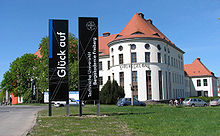campus

The campus (plural: campus, colloquially also campuses ) is the coherent complex of buildings that belong to the same university , college (university center, university center) or the same research institute .
US campus
The name campus [ ˈkampʊs ] is of Latin origin and means 'field' in this language. He called in the United States since the 18th century, built outside the city building a university , are usually surrounded by park-like plants. The term was first used at the College of New Jersey, founded in 1746 (now Princeton University ).
Campus in Germany
In the 1960s, the term was borrowed from the American in Germany. Since then, “campus universities” have been understood as universities where teaching and research facilities and often other university-related infrastructure such as B. Living space for teachers and students as well as green areas are combined in one area instead of being spread across the city. In contrast to the classic European universities, German university establishments were now often no longer integrated in a central location in the city, but instead formed their own small districts on the edge or immediately outside the city. This development began in 1946 with the Free University of Berlin (FU Berlin) and its campus in Berlin-Dahlem. Bochum (1962), the first German university campus with teaching and research facilities, dormitories and university-related infrastructure, was one of the early foundations of such universities, which were located “on the greenfield” and “ Trabanten ” in an urban environment . This was followed by Düsseldorf (1965), Bielefeld (1969), Bremen (1971) and numerous others.
Further examples are the universities of Augsburg , Bayreuth , Cottbus , Dortmund , Dresden , Duisburg , Erfurt , Essen , Flensburg , Hohenheim , Ilmenau , Kaiserslautern , Kassel , Koblenz , Konstanz , Lübeck , Magdeburg , Mainz , Oldenburg , Paderborn , Passau , Potsdam , Regensburg , Saarbrücken , Siegen , Ulm , Trier , Vechta as well as the Helmut Schmidt University / University of the Federal Armed Forces Hamburg and the University of the Federal Armed Forces Munich .
A similar development is the construction of a new campus away from existing higher education institutions in the city center, such as the Vaihingen-Pfaffenwald campus of the University of Stuttgart . It was comparable to the new campuses for natural sciences with traditional universities such as Freiburg , Heidelberg and Tübingen . Another model resulted from a merger at the Karlsruhe Institute of Technology .
Shifting the term
In the United States, the original meaning lasted until the 1950s, but was gradually carried over to the entire university complex. Finally, other institutions such as companies or hospitals also used the term for their premises there, presumably to use its positive meaning or to refer to the research character of their activities. One example is the Microsoft campus in Redmond, Washington; the structure of a complex surrounded by greenery on the outskirts was given here. In Germany, the term is now also used without reference to a university, for example in office buildings.
The term has recently been expanded in Germany and is now generally used for university facilities, even if they are located within the city. An example would be the University of Mannheim , whose campus extends over Mannheim Palace and the immediate vicinity. In Bonn, the “Poppelsdorf Campus” of the Rheinische Friedrich-Wilhelms-Universität is currently being built in the open, but close to the city center . In Germany, too, in order to exaggerate its own meaning, there is an expansion of the term, similar to the USA, to spatially connected buildings of other institutions, for example hospitals. In Kiel , the site of the University Clinic is also referred to as the Kiel campus to distinguish it from the second location in Lübeck .
In particular, the term campus is used to describe loose, modern building complexes that are specially designed for teaching and research. One example is the campus of the University of Vienna on the site of the Old General Hospital near Ringstrasse. Although it only encompasses a small part of the University of Vienna, it houses over 15 departments that were previously distributed across the city and a number of student-style restaurants. Similar to the Techno-Z Salzburg for private research as well as the campus of the University of Salzburg , or the Rottenmann University Center as a branch of two universities in a specialized research region. Here, the close networking of universities and companies promoted today, some specializing in research and development , some direct private-sector spin-offs from the universities, is also promoted in terms of urban planning and architecture ( competence center ). Examples of recent campuses are the Krems campus and the Tulln campus.
When functional infrastructure is mapped in web systems, this is figuratively referred to as an e-campus .
Web links
- Literature on campus in the catalog of the German National Library
Individual evidence
- ↑ Duden | Campus | Spelling, meaning, definition, synonyms, origin. Retrieved January 19, 2018 .
- ^ Campus. duden.de, accessed on August 2, 2017 .
- ↑ Two thirds of all institutes and research facilities are now located on the Stuttgart-Vaihingen research campus. See here.
- ↑ 100 year old humus. In: bonnweh.de. March 24, 2012, accessed August 21, 2014 .
- ↑ Welcome to the University of Vienna campus. University of Vienna, accessed on August 21, 2014 .
